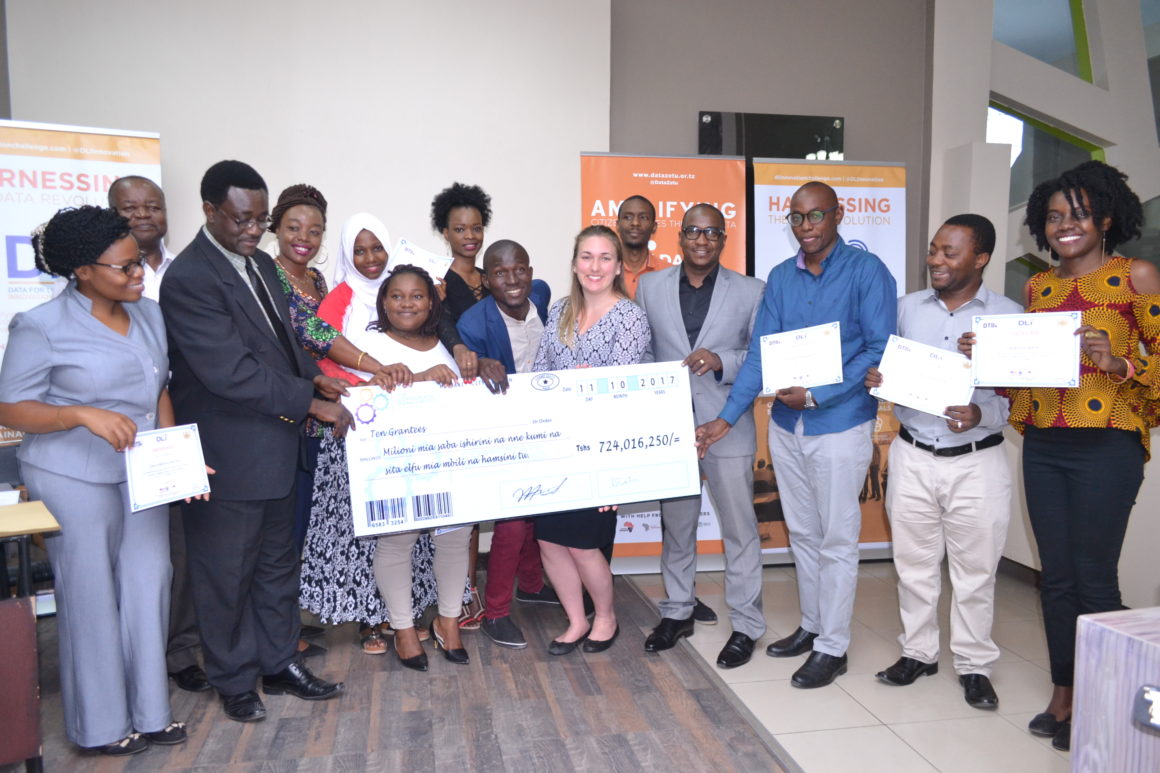Nine individual innovators from across Tanzania and one Tanzanian not-for-profit social enterprise, Ubongo Kids, have been awarded grants to implement data-focused health solutions through the Data for Local Impact Innovation Challenge (DLIIC) funded by the U.S. Government’s President’s Emergency Plan for AIDS Relief (PEPFAR) under the Data Collaborative for Local Impact (DCLI) partnership overseen by the Millennium Challenge Cooperation (MCC). These entrepreneurs will receive awards ranging from 10,000 to 25,000 USD (individuals) and 100,000 USD (organization) as well as technical and mentoring support to implement a variety of community-based solutions.
On 11 October 2017, DLIIC celebrated these innovators as part of festivities for the International Day of the Girl Child, building on the United Nations 2017 theme of “The Power of the Adolescent Girl: Vision for 2030”.
The Data for Local Impact Innovation Challenge’s first Challenge Window launched in October 2016 and aimed to increase the use of data for improved health outcomes, and to support the health priorities of the Tanzanian Government. This second Innovation Challenge Window also focused on health priorities of the Tanzanian Government, and specifically supported strategic PEPFAR programming addressing the HIV/AIDS epidemic among Adolescent Girls and Young Women (AGYW), a partnership referred to as DREAMS (Determined, Resilient, Empowered, AIDS Free, Mentored, and Safe).
The DREAMS Partnership supports vulnerable adolescent girls and young women aged 10-24, with a special focus on 15 to 24-year-olds. These populations are 2.5 times more likely to contract HIV/AIDs than their male counterparts. The DREAMS Partnership aims to reduce this vulnerability of AGYW by decreasing new HIV infections among 15-24-year-olds by 40% through a core package of evidence-based interventions targeted at 4 overlapping populations: young women, their care givers, their sexual partners, and their community members. These interventions have been proven to mitigate HIV risk behaviors, HIV transmission, and gender based violence (GBV).
The second Challenge Window invited local developers to generate new innovations, technologies, and processes that use data to address issues facing AGYW, and contribute to reducing HIV infection. Winning proposals included solutions addressing the following thematic areas:
- Increasing male partner participation in creating a safe and protective environment for AGYW;
- Decreasing early school dropouts that limit opportunities for AGYW;
- Expanding economic empowerment and strategies to increase economic independence for AGYW; and
- Augmenting AGYW leadership and decision-making in the fight against HIV.
Ten proposals were selected from 190 applications after review by an independent jury of Tanzanian entrepreneurial, innovation, health, and gender experts. The proposals were required to produce or use open data sets, be operational within three to six months, and focus on issues facing youth, young women and marginalized communities. The solutions were also required to target at least one of the 89 districts that are considered priorities under the PEPFAR 2017 Tanzanian Country Operational Plan (COP) and/or under Global Fund program, developed in collaboration with the Government of Tanzania. The winning proposals, listed by team leader’s name according to their proposal’s theme, are as follows:
Increasing male partner participation in creating a safe and protective environment for AGYW
- Leyla Liana Hamisi
- Mkata Nyoni
Decreasing early school dropouts that limit opportunities for AGYW
- Husseni Kiranga
- Judith Leo
- Maria Dorin Shayo
- Wilson Mnyabwilo
Expanding economic empowerment and strategies to increase economic independence for AGYW
- Doreen Kessy – Ubongo Kids
Augmenting AGYW leadership and decision-making in the fight against HIV
- Asha Kombo
- Emila Msangi
- Musafiri Mbilinyi
“The Data for Local Impact Innovation Challenge aims to engage, support, and connect Tanzanian innovators, developers, solution providers and beneficiaries to each other as well as to opportunities to make a difference in people’s lives,” said Agapiti Manday, DLIIC’s Program Manager.
The DLIIC is organized to strategically and actively engage youth, sharpen their data use and data science capabilities, and contribute to PEPFAR’s goal of greater participation of national citizens in controlling, and ultimately ending, the AIDS epidemic.
The winners will start their mentorship and training in October 2017, and will work on implementing their projects over 3-6 months. They will be part of an entrepreneurial program that will enhance their practical project management skills, business acumen, and data science capabilities. Most importantly, these winning innovators will be spearheading meaningful solutions in their communities to impact in the lives of Tanzanians, particularly adolescent girls and young women.




Leave a Reply